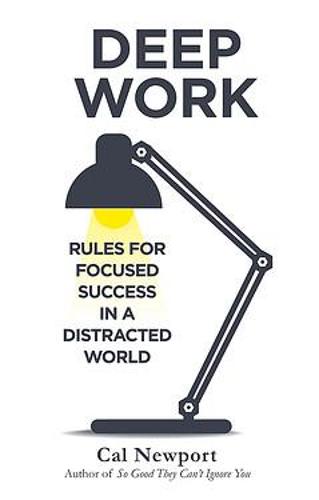
I decided to read Deep Work by Cal Newport after hearing it recommended more than once on Curtis McHale’s excellent YouTube channel.
Newport defines Deep Work as: ‘Professional activities performed in a state of distraction-free concentration that push your cognitive capabilities to their limit. These efforts create new value, improve your skill, and are hard to replicate.’
He contrasts Deep Work with Shallow Work: ‘Noncognitively demanding, logistical-style tasks, often performed while distracted. These efforts tend not to create much new value in the world and are easy to replicate.’
In part one of the book, Newport sets out to convince us of the value and difficulty of performing deep work. I didn’t find this section at all useful: if I wasn’t already convinced, I wouldn’t have been reading the book in the first place.
In part two, Newport provides advice on how to go about giving deep work the priorities it needs, and on developing your deep work skills. There’s some sound advice in here—much of it obvious, but with a few non-obvious ideas worth thinking about. The following sort of things:
- Avoid social media, and replying to emails, unless it significantly helps achieve your key goals.
- Constantly flipping back and forth between deep and shallow work is a deep work killer. It takes time to get in the zone.
- Keep some sort of scoreboard of the amount of deep work you do each day as an encouragement to maintain streaks.
- Learn to embrace boredom (as opposed to constantly checking social media as soon as you feel bored). This will help break distracting habits.
- Set yourself artificially tight deadlines.
- Time-block your daily work, making suitable allowances for deep work, shallow work, and contingency. Monitor progress against these time-blocks and update throughout the day. The purpose of this is not to plan your day, but to recognise how bad you are at estimating task durations, and to identify stuff that gets in the way of deep work.
- Learn to say no to shallow work.
- When accepting shallow work from/with others, set/define expectations about what you are/are not prepared to contribute.
Deep Work didn’t provide as many suggestions as I’d hoped, but it did give some useful food for thought. I’ll probably revisit part two some time.
- Buy this book from Bookshop.org (UK) and help tax-paying, independent bookshops.
- Buy this book from Amazon.co.uk
- Buy this book from Amazon.com